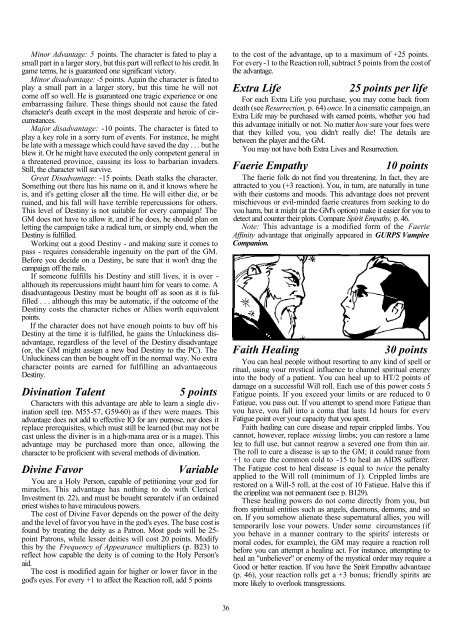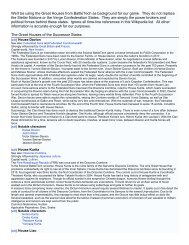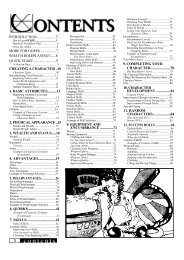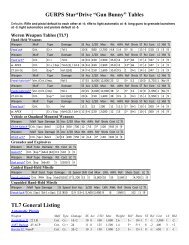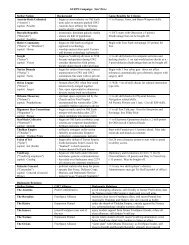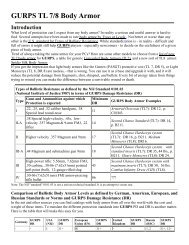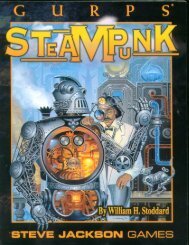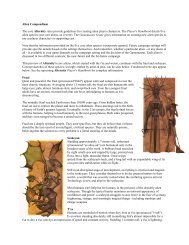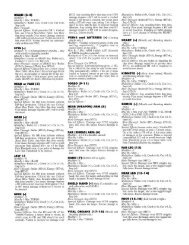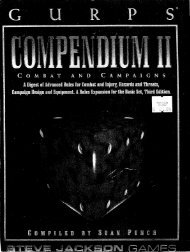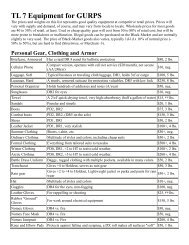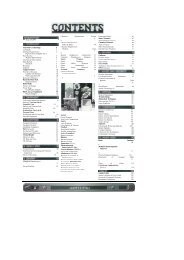GURPS - Compendium 1..
GURPS - Compendium 1..
GURPS - Compendium 1..
You also want an ePaper? Increase the reach of your titles
YUMPU automatically turns print PDFs into web optimized ePapers that Google loves.
Minor Advantage: 5 points. The character is fated to play a<br />
small part in a larger story, but this part will reflect to his credit. In<br />
game terms, he is guaranteed one significant victory.<br />
Minor disadvantage: -5 points. Again the character is fated to<br />
play a small part in a larger story, but this time he will not<br />
come off so well. He is guaranteed one tragic experience or one<br />
embarrassing failure. These things should not cause the fated<br />
character's death except in the most desperate and heroic of circumstances.<br />
Major disadvantage: -10 points. The character is fated to<br />
play a key role in a sorry turn of events. For instance, he might<br />
be late with a message which could have saved the day . . . but he<br />
blew it. Or he might have executed the only competent general in<br />
a threatened province, causing its loss to barbarian invaders.<br />
Still, the character will survive.<br />
Great Disadvantage: -15 points. Death stalks the character.<br />
Something out there has his name on it, and it knows where he<br />
is, and it's getting closer all the time. He will either die, or be<br />
ruined, and his fall will have terrible repercussions for others.<br />
This level of Destiny is not suitable for every campaign! The<br />
GM does not have to allow it, and if he does, he should plan on<br />
letting the campaign take a radical turn, or simply end, when the<br />
Destiny is fulfilled.<br />
Working out a good Destiny - and making sure it comes to<br />
pass - requires considerable ingenuity on the part of the GM.<br />
Before you decide on a Destiny, be sure that it won't drag the<br />
campaign off the rails.<br />
If someone fulfills his Destiny and still lives, it is over -<br />
although its repercussions might haunt him for years to come. A<br />
disadvantageous Destiny must be bought off as soon as it is fulfilled<br />
. . . although this may be automatic, if the outcome of the<br />
Destiny costs the character riches or Allies worth equivalent<br />
points.<br />
If the character does not have enough points to buy off his<br />
Destiny at the time it is fulfilled, he gains the Unluckiness disadvantage,<br />
regardless of the level of the Destiny disadvantage<br />
(or, the GM might assign a new bad Destiny to the PC). The<br />
Unluckiness can then be bought off in the normal way. No extra<br />
character points are earned for fulfilling an advantageous<br />
Destiny.<br />
Divination Talent<br />
5 points<br />
Characters with this advantage are able to learn a single divination<br />
spell (pp. M55-57, G59-60) as if they were mages. This<br />
advantage does not add to effective IQ for any purpose, nor does it<br />
replace prerequisites, which must still be learned (but may not be<br />
cast unless the diviner is in a high-mana area or is a mage). This<br />
advantage may be purchased more than once, allowing the<br />
character to be proficient with several methods of divination.<br />
Divine Favor<br />
Variable<br />
You are a Holy Person, capable of petitioning your god for<br />
miracles. This advantage has nothing to do with Clerical<br />
Investment (p. 22), and must be bought separately if an ordained<br />
priest wishes to have miraculous powers.<br />
The cost of Divine Favor depends on the power of the deity<br />
and the level of favor you have in the god's eyes. The base cost is<br />
found by treating the deity as a Patron. Most gods will be 25-<br />
point Patrons, while lesser deities will cost 20 points. Modify<br />
this by the Frequency of Appearance multipliers (p. B23) to<br />
reflect how capable the deity is of coming to the Holy Person's<br />
aid.<br />
The cost is modified again for higher or lower favor in the<br />
god's eyes. For every +1 to affect the Reaction roll, add 5 points<br />
to the cost of the advantage, up to a maximum of +25 points.<br />
For every -1 to the Reaction roll, subtract 5 points from the cost of<br />
the advantage.<br />
Extra Life<br />
25 points per life<br />
For each Extra Life you purchase, you may come back from<br />
death (see Resurrection, p. 64) once. In a cinematic campaign, an<br />
Extra Life may be purchased with earned points, whether you had<br />
this advantage initially or not. No matter how sure your foes were<br />
that they killed you, you didn't really die! The details are<br />
between the player and the GM.<br />
You may not have both Extra Lives and Resurrection.<br />
Faerie Empathy<br />
10 points<br />
The faerie folk do not find you threatening. In fact, they are<br />
attracted to you (+3 reaction). You, in turn, are naturally in tune<br />
with their customs and moods. This advantage does not prevent<br />
mischievous or evil-minded faerie creatures from seeking to do<br />
you harm, but it might (at the GM's option) make it easier for you to<br />
detect and counter their plots. Compare Spirit Empathy, p. 46.<br />
Note: This advantage is a modified form of the Faerie<br />
Affinity advantage that originally appeared in <strong>GURPS</strong> Vampire<br />
Companion.<br />
Faith Healing<br />
30 points<br />
You can heal people without resorting to any kind of spell or<br />
ritual, using your mystical influence to channel spiritual energy<br />
into the body of a patient. You can heal up to HT/2 points of<br />
damage on a successful Will roll. Each use of this power costs 5<br />
Fatigue points. If you exceed your limits or are reduced to 0<br />
Fatigue, you pass out. If you attempt to spend more Fatigue than<br />
you have, you fall into a coma that lasts 1d hours for every<br />
Fatigue point over your capacity that you spent.<br />
Faith healing can cure disease and repair crippled limbs. You<br />
cannot, however, replace missing limbs; you can restore a lame<br />
leg to full use, but cannot regrow a severed one from thin air.<br />
The roll to cure a disease is up to the GM; it could range from<br />
+1 to cure the common cold to -15 to heal an AIDS sufferer.<br />
The Fatigue cost to heal disease is equal to twice the penalty<br />
applied to the Will roll (minimum of 1). Crippled limbs are<br />
restored on a Will-5 roll, at the cost of 10 Fatigue. Halve this if<br />
the crippling was not permanent (see p. B129).<br />
These healing powers do not come directly from you, but<br />
from spiritual entities such as angels, daemons, demons, and so<br />
on. If you somehow alienate these supernatural allies, you will<br />
temporarily lose your powers. Under some circumstances (if<br />
you behave in a manner contrary to the spirits' interests or<br />
moral codes, for example), the GM may require a reaction roll<br />
before you can attempt a healing act. For instance, attempting to<br />
heal an "unbeliever" or enemy of the mystical order may require a<br />
Good or better reaction. If you have the Spirit Empathy advantage<br />
(p. 46), your reaction rolls get a +3 bonus; friendly spirits are<br />
more likely to overlook transgressions.<br />
36


